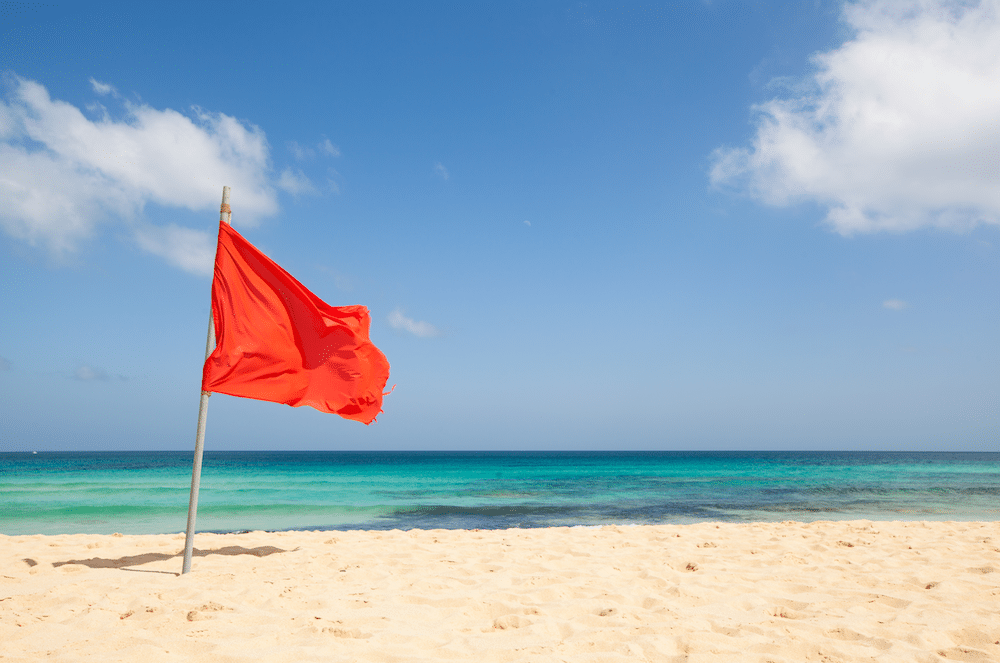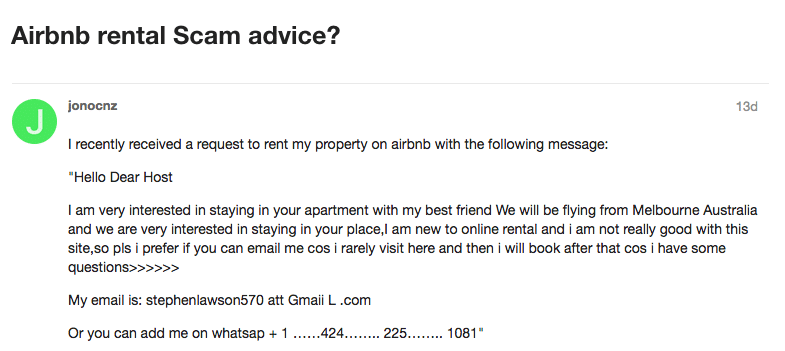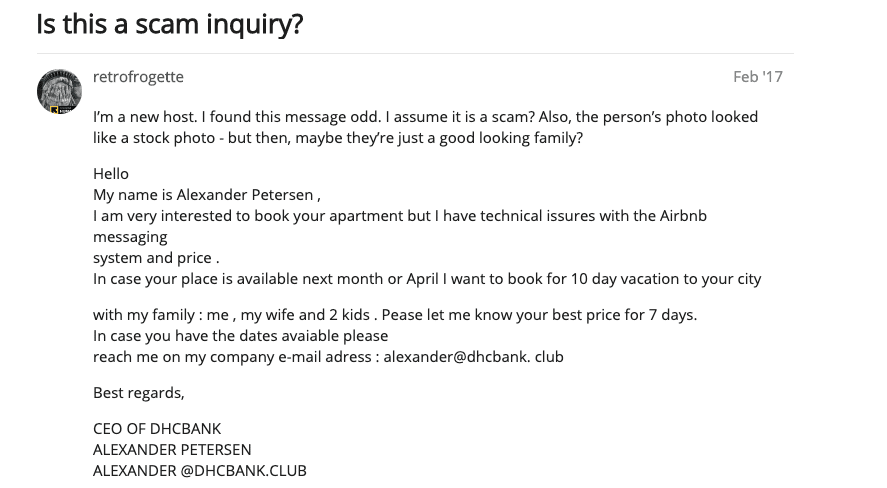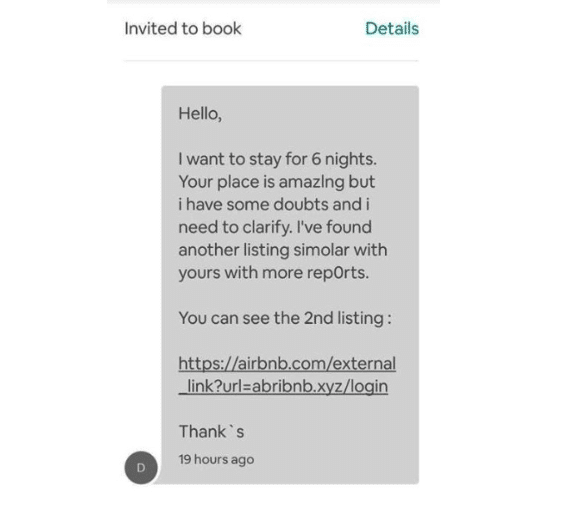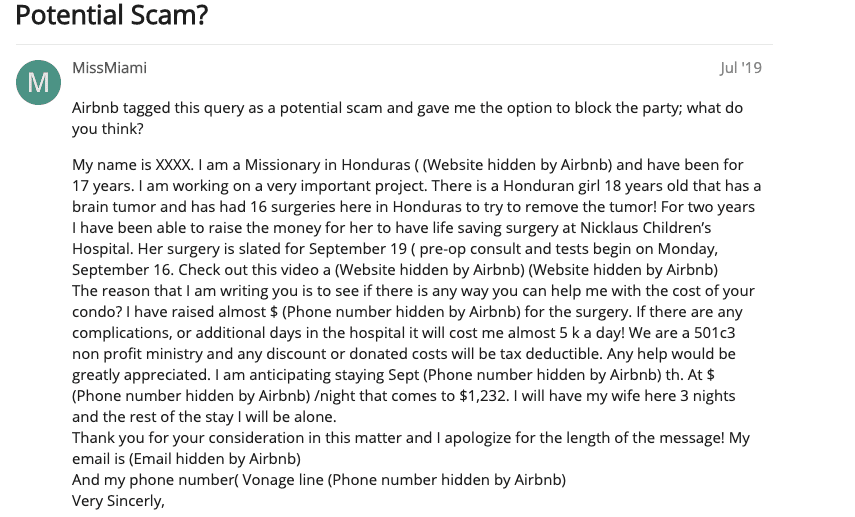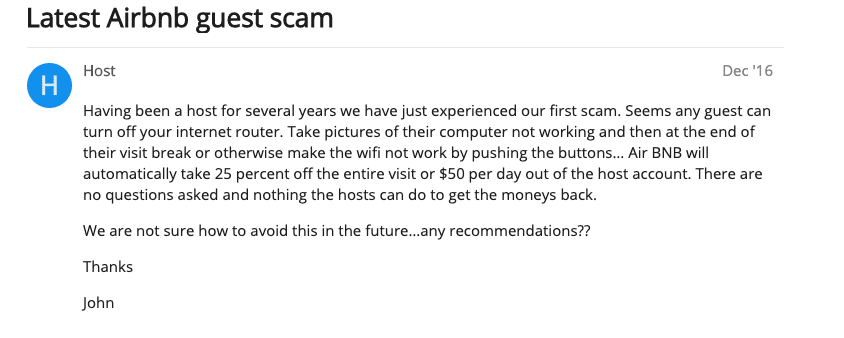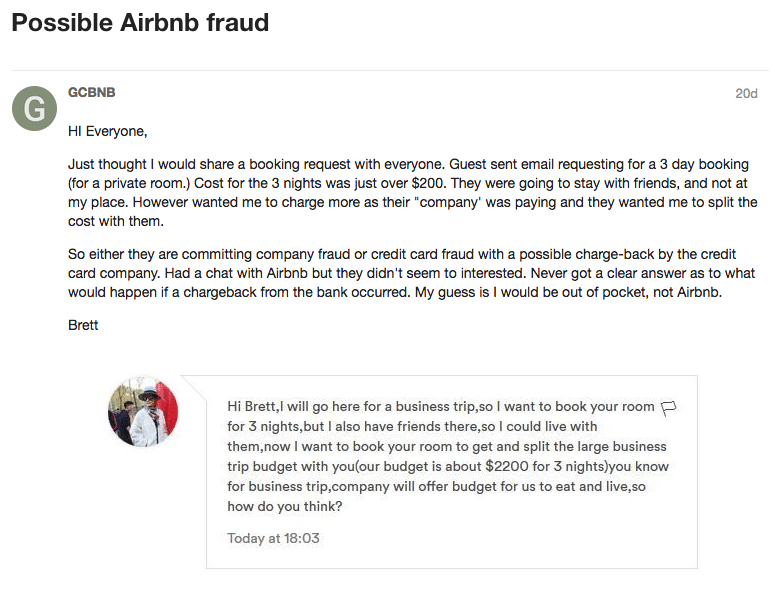Any transaction or business conducted online runs the risk of falling into the hands of scammers. With the rise in demand for rentals, this industry is now more prone than ever to fraud. Unfortunately, some potential guests aren’t all they seem, and at times, there’s not much you can do once you’ve become a victim of a scam.
We’re not just referring to guests who steal things in your rental or host unauthorized parties but scammers who will try and clear out your bank account. In this article, we include real-life examples that will help you not only avoid fraudsters but also recognize them and prevent any damage before it’s too late.
Don’t see the form to download the Rental Agreement Template? Click here.
How do fraud and vacation rental scams happen?
For the most part, renting out your vacation home is a safe process. Once you’ve got your vacation rental website in order, you can enjoy seeing the bookings rolling in. However, there may be people out there trying to deceive you.
According to the latest internet crime report by the FBI’s Internet Crime Complaint Center (IC3), approximately 12,000 individuals were targeted by real estate scams, including those related to short-term rentals, resulting in nearly $400 million in losses during the year 2022.
Online booking sites are a prime target for scammers for a number of reasons. Not only are travel reservations usually high-ticket items (Sift Science found the average price of a fraudulent booking ranges from $238-$588), but they are also intangible – meaning there is no physical item to send or collect.
In addition to this, online bookings happen fast – instantly, even. As reservations can time out in just a few hours, it can be difficult to detect and block scam guests at the point of purchase.
Vacation rental scams: Warning signs to look out for
To keep yourself and your business safe online, it’s important to prepare for any potential risks to avoid becoming vulnerable to scams. Here are our top 20 warning signs that your guests are trying to defraud you.
1. Lack of basic language skills
A poorly worded message that contains many spelling mistakes and poor punctuation is the most common way to detect a potential Airbnb scam. While it may not be true in all cases, e.g., international travelers or renters who don’t speak English fluently, it can be a big red flag for homeowners.
If the person inquiring shows extremely little understanding of basic language skills and is very repetitive in what they’ve written, ask yourself twice before accepting: this could be Airbnb fraud.
2. Sketchy email address
Where you’re being contacted can also be an indicator of fraud. Have you heard of the email provider they’re using? Check that the guest’s name and email correspond to one another. If there are any discrepancies here, this guest could also be a fake.
Typical sketchy email addresses include random capitalized letters, multiple numbers, underscores, and the use of the letter“x”. Basically, something that doesn’t make sense at all. For example: “nxJyleqR_6MoDq@syg6.gidjex.com.”
3. Too much information
Scammers tend to give more information than you need in booking requests. For instance, they may say they don’t have animals, don’t smoke or drink – anything that leads to them being a “perfect guest.” This is a trap they use against the host, leading them to believe they won’t cause any problems when they are the ones who actually want to scam you.
Similarly, if an inquirer has written much more than you expected for an initial email, such as unnecessary information like their occupation or profession (be especially cautious if they purposely mention they’re a captain, religious figure, or an officer in the forces), or a long-winded story they’ve spun about why they’re visiting your city, keep them at arm’s length and don’t believe everything you read.
4. Surprise or gift for someone else
Of course, some people do genuinely surprise their loved ones with a vacation, but others may use this as an excuse to pull one over on hosts. If they say that the property is a gift or a surprise for someone else, make sure you have the names and contact details for the entire booking party. When you’re accepting booking requests, it might also be a good idea to take a security deposit or impose a strict cancelation policy to avoid scammers targeting you.
5. Avoid your preferred payment method
You have a booking system on your site for a reason – to take online bookings and accept secure credit card payments. Therefore if a potential guest ever offers to pay outside of your website, e.g., by certified check, cashier’s check, bank wire transfer or even in cash upon arrival, alarm bells should ring as these payments won’t be secure or guaranteed.
6. Incorrect property information
If you receive an inquiry or booking request from someone who refers to your countryside ranch as a “penthouse apartment”, this should raise a few red flags too. Similarly, if they tell you how much they like your room when you actually have an entire house.
More often than not, this is a blanket message that they would’ve sent to multiple vacation rental owners, and they’re waiting for just one of them to fall victim to their scam. Read the messages carefully so you can spot these little inconsistencies, which will prevent you from falling into a vacation rental scam.
7. No specific dates
It’s possible that guests genuinely are flexible with their travel dates, and they simply have their hearts set on your rental for their vacation. However, when an inquiring guest asks about very specific dates, then retracts their question and tells you their dates are flexible, they might be trying to scam you.
8. Send keys in the post
Before the industry exploded, it was common practice to send your guests maps, entry instructions, and even keys via snail mail. Nowadays, however, it’s a different story. Many owners rely on automated check-in methods like lockboxes, electronic smart locks or even a property manager to handle guest changeover.
There shouldn’t be any need to send physical keys in the post. If your vacation rental keys fall into the wrong hands, you could be looking at footing an expensive locksmith bill, not to mention the potential risks to the contents of your property.
9. Last-minute and same-day bookings
Of course, sometimes you have to give guests the benefit of the doubt and believe their story. Their hotel is overbooked, or they decided to genuinely book a vacation last-minute – it’s a perfectly plausible excuse. But if the story doesn’t quite add up, use these methods to screen guests and don’t be afraid to ask for verification.
It’s always advisable to go with your gut – even if it may affect your position in Airbnb search results; it’s better than being burgled by last-minute guests!
10. Hack your account
New Airbnb scams have emerged: stealing your personal data and using it against you. Scammers intend to steal the homeowner’s identity to defraud other guests or to use that identity to carry out other fraudulent activities in their name, such as clearing out your bank account and even of potential guests!
In the case listed above, the scammer sends a link to the host, which will enable them to have full access to their Airbnb account. From then on, they can do anything on their account. Make sure to have a secure password across all your listing accounts and to protect your guests’ data online.
11. “Refund me or I’ll write a negative review”
As a host, you’re already aware of how important it is to have a reputation online and how valuable past guest reviews are to future guests. Therefore a negative review can impact your business. And that’s why some Airbnb and Vrbo scams involve blackmailing the hosts into giving them a full refund.
A good practice, if you are involved in these scams, is to be honest and respond to the comment indicating to other guests that this is a fraudulent act. Focus on all the positive reviews, so that when potential guests are viewing your property, they’ll see that you have credibility and will notice that you had a fraudulent guest.
Another security measure you can take to avoid this scam is to have your own website for your vacation rental. You’ll be able to discard reviews from scammers who tried to blackmail you.
12. Overpayments
If the guest claims to have paid more than the total price indicated on your website, this should be another warning sign. Overpay vacation rental scams have been happening recently, with new hoax guests even using stolen credit cards for these tricks.
In this type of con, guests will send more money than the booking amount requires, but before you or your bank can realize this, you’ll have received messages from the guest asking for a refund on the overpayment. Watch out because many guests will use the “business traveler” excuse, saying that travel departments have made a mistake when in reality, the booker is using stolen information to make the payment.
Sometimes the scammer sends a fake check or a transfer that won’t be available, so the money the owner is “reimbursing” will be the money the scammer ends up subtracting since the scammer hasn’t actually paid anything. Many times, these criminals offer more money than the landlord asks for. Don’t take any chances. If someone offers you more money than you’re asking for, stick to your payment policy and cut off all communication.
13. Ask for a discount
Fraudsters may make up a story and ask you for a discount. No matter how convincing it may be, always stick to the price you’ve put up and, once again, stick to your preferred payment method.
14. Turn your Wifi off
Scammers don’t just operate online, but in your vacation rental house too. And lately, they’ve become creative and will do anything they can to get their hands on some extra cash. By turning off the WiFi in your vacation rental, they can automatically claim compensation from Airbnb.
To avoid this technique, it’s best to keep the router out of your guest’s sight so it won’t be touched or moved by anyone. You could even put it in a drawer or in a box locked with a code. There are also measures you can implement on your WIFI to ensure cyber security for you and your guests.
15. Pretend they’re someone else
Some scammers will falsely represent themselves as a lawyer, saying you’re entitled to a tax return. In the same way, some may offer your compensation for damages done by previous guests, whether that occurred or not. Most start by asking for your social security number, but don’t give it to them.
On many occasions, the scammer pretends to be a former guest and complains about a certain thing and asks for a refund. Fraudsters can easily access the names of your previous guests through your Airbnb reviews and pretend to be them. So if in doubt, contact your previous guests directly and use the same phone number as you did when they stayed at your rental.
16. It Just doesn’t feel right
If it sounds too good to be true, it probably is. And this couldn’t be more appropriate for the world of vacation rentals. A guest offering to pay extra for a low-season week because they love your place? Scam! A single traveler renting your five-bedroom house for themselves? Scam! Anything that makes you second-guess your guest’s integrity? Probably a scam! Trust your instinct, and don’t accept any bookings that make you doubt the guest’s intentions.
17. Unusually long booking requests
One aspect that demands particular caution is the occurrence of unusually long booking requests. While such inquiries might seem like an enticing opportunity to secure a steady income, hosts should be wary. These requests could be red flags for hoax guests seeking to exploit hosts or engage in illicit activities. While not all long bookings are malicious, they may create challenges for hosts, ranging from potential property damage to legal complications.
In many states, the maximum occupancy length is 30 days, and this can lead to the possibility of squatters taking advantage of your property. Squatters refer to guests who deliberately refuse to vacate the property at the end of their booked stay. These individuals often display a level of sophistication, using their knowledge of rental laws to their advantage. Instead of abiding by the agreed-upon check-out date, they knowingly and willfully extend their stay without seeking any permission from the host or property owners.
This practice has become a concern for many hosts as it can lead to significant disruptions, financial losses, and legal complexities.
18. Avoiding answering direct questions
While most travelers are genuine and respectful, there are occasional hoax guests who may try to exploit your trust. Avoiding direct questions could be a warning sign, as it might indicate a lack of transparency or an attempt to conceal crucial information.
Engaging in open communication is vital for establishing mutual trust and understanding between hosts and guests. A guest’s reluctance to provide straightforward answers about their trip purpose, the number of guests, or specific requirements may indicate they have something to hide or are not entirely committed to their reservation
19. Unverified or suspicious profiles
Spotting hoax guests begins with a vigilant eye for incomplete profiles, vague descriptions, or a lack of verifiable reviews. Trust your instincts, and don’t hesitate to request additional verification or documentation if something feels off. By prioritizing the safety and security of your property and guests, you can create a welcoming and trustworthy environment for all genuine travelers.

20. Multiple last-minute changes
As short-term rental hosts, it’s essential to approach last-minute changes to bookings with caution. While it’s not uncommon for genuine travelers to encounter unexpected circumstances, multiple last-minute changes might be a cause for concern. Engaging with such guests could lead to various issues, from financial losses due to canceled bookings to property damage or misuse.
Scammers may exploit hosts’ willingness to accommodate changes and exploit their trusting nature. Therefore, it’s crucial to exercise vigilance and establish clear policies for handling alterations to bookings. By communicating openly with guests and verifying the reasons behind their requests, hosts can protect themselves from falling victim to hoax guests and ensure a safe and pleasant experience for both parties involved.
Nowadays, there is an array of common vacation rental scams that hoax guests will use to catch owners off guard and take advantage of them. We hope none of you have fallen for a guest’s vacation rental scam in the past – you certainly won’t now that you know what to watch out for!
If there’s a scam we’ve missed, feel free to let us know in the comments below!
Don’t see the form to download the Rental Agreement Template? Click here.
